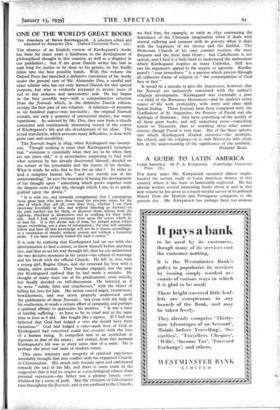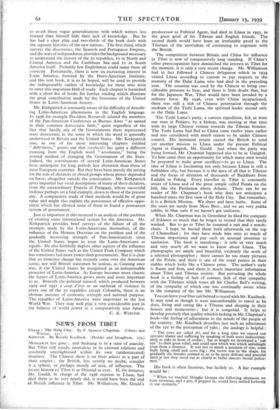A GUIDE TO LATIN AMERICA
FOR many years Mr. Kirkpatrick sustained almost single- handed the serious study of Latin American history in this country where it has been so lamentably neglected. He has already written several interesting books about it and in this new volume he has given us a much needed survey of its political history from the Spanish and Portuguese conquests to the present day. Mr. Kirkpatrick has perhaps been too anxious
to avoid those vague generalisations with which writers less learned than himself hide their lack of knowledge. But he has had a clear plan and two-thirds of the book deals with the separate histories of the new nations. The first third, which surveys the discoveries, the Spanish and Portuguese Empires, and the wars of independence, provides the background necessary to understand the history of the 20 'republics, to in North and Central America and the Caribbean Sea and to in South America itself. Probably few Englishmen could name them all correctly. Fortunately, there is now an increasing interest in Latin America, fostered by the Ibero-American Institute, and this text book, it is to be hoped, will be used to provide the indispensable outline of knowledge for those who wish to enter this important field of study. Each chapter is furnished with a short list of books for further reading which illustrate the great contribution made by the historians of the United States to Latin-American history.
Mr. Kirkpatrick is constantly aware of the difficulty of describ- ing Latin-American phenomena in the English language. In 1936 for example President Roosevelt saluted the members of the Pan-American Conference at Buenos Aires " as united in their common democratic faith," quite regardless of the fact that hardly ariy of the Governments there represented were democratic in the sense in which the word is generally understood in Britain and the United States. Mr. Kirkpatrick also, in one of his most interesting chapters entitled " definitions," points out that revolucidn has quite a different meaning from the English word " revolution," being the normal method of changing the Government of the State. Indeed, the constitutions of several Latin-American States have undergone for long periods less alteration than those of most European countries. But they have been merely the setting for the rule of dictators or closed groups whose power depended on forces altogether outside the constitution. Mr. Kirkpatrick gives impartial but vivid descriptions of many of these dictators, from the extraordinary Francia of Paraguay, whose successful violence perhaps set a fatal example, down to those of the present day. A comparative study of their methods would be of great value and might also explain the persistence of effective oppo- sition which has allowed none of them to found a permanent system of government.
Just as important at this moment is an analysis of the problem of creating some international system for the Americas. Mr. Kirkpatrick provides brief surveys of the failure of all the attempts made by the Latin-Americans themselves, of the influence of the Monroe Doctrine on the problem and of the gradually increasing strength of Pan-Americanism since the United States began to treat the Latin-Americans as equals. He also faithfully depicts other aspects of the influence of the United States such as the United Fruit Company which has sometimes had more power than governments. But it is clear that an immense change has recently come over the American scene, nor will British statesmen be jealous, as Canning once was, if the United States be recognised as an indispensable protector of Latin-America. As Europe becomes more chaotic the future of Latin-America grows more and more important to us. Beneath the political turmoil which produced between 1929 and 1931 a coup d'etat or an outbreak of violence in every one of the 20 republics except Colombia, there is an obvious increase of economic strength and national purpose. The republics of Latin-America were important in the last World War. They may well play a very considerable part in the balance of world power in a comparatively near future.
C. K. WEBSTER.







































 Previous page
Previous page